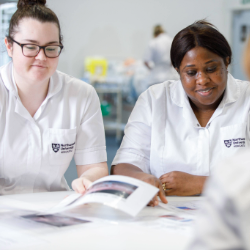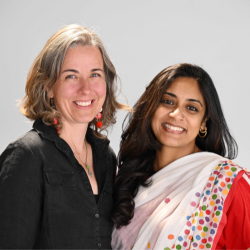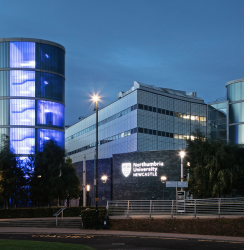-
Study
-
Undergraduate
- UCAS Clearing & Confirmation 2025
- Application Guides
- UCAS Exhibitions
- Foundation Years
- School & College Outreach
- Information for Parents
-
Postgraduate
- Application Guide
- Postgraduate Research Degrees
- Flexible Learning
- Change Direction
- Register your Interest
-
Student Life
- Students' Union
- The Hub - Student Blog
- Accommodation
- Northumbria Sport
- Support for Students
-
Learning Experience
- Real-World Learning
- Research-enriched learning
- Graduate Futures
- The Business Clinic
- Study Abroad
-
-
International
International
Northumbria’s global footprint touches every continent across the world, through our global partnerships across 17 institutions in 10 countries, to our 277,000 strong alumni community and 150 recruitment partners – we prepare our students for the challenges of tomorrow. Discover more about how to join Northumbria’s global family or our partnerships.
View our Global Footprint-
Quick Links
- Course Search
- Undergraduate Study
- Postgraduate Study
- Information for Parents
- London Campus
- Northumbria Pathway
- Cost of Living
- Sign up for Information
-
International Students
- Information for International Students
- International Events
- Application Guide
- Entry Requirements and Education Country Agents
- Global Offices
- English Requirements
- English Language Centre
- International student support
- Cost of Living
-
International Fees and Funding
- International Undergraduate Fees
- International Undergraduate Funding
- International Masters Fees
- International Masters Funding
- International Postgraduate Research Fees
- International Postgraduate Research Funding
-
International Partners
- Agent and Representatives Network
- Global Partnerships
- Global Community
-
International Mobility
- Study Abroad
- Information for Incoming Exchange Students
-
-
Business
Business
The world is changing faster than ever before. The future is there to be won by organisations who find ways to turn today's possibilities into tomorrows competitive edge. In a connected world, collaboration can be the key to success.
More on our Business Services -
Research
Research
Northumbria is a research-rich, business-focused, professional university with a global reputation for academic quality. We conduct ground-breaking research that is responsive to the science & technology, health & well being, economic and social and arts & cultural needs for the communities
Discover more about our Research-
Quick Links
- Research Peaks of Excellence
- Academic Departments
- Research Staff
- Postgraduate Research Studentships
- Research Events
-
Research at Northumbria
- Interdisciplinary Research Themes
- Research Impact
- REF
- Partners and Collaborators
-
Support for Researchers
- Research and Innovation Services Staff
- Researcher Development and Training
- Ethics, Integrity, and Trusted Research
- University Library
- Vice Chancellors Fellows
-
Research Degrees
- Postgraduate Research Overview
- Doctoral Training Partnerships and Centres
- Academic Departments
-
Research Culture
- Research Culture
- Research Culture Action Plan
- Concordats and Commitments
-
-
About Us
-
About Northumbria
- Our Strategy
- Our Staff
- Our Schools
- Place and Partnerships
- Leadership & Governance
- University Services
- History of Northumbria
- Contact us
- Online Shop
-
-
Alumni
Alumni
Northumbria University is renowned for the calibre of its business-ready graduates. Our alumni network has over 250,000 graduates based in 178 countries worldwide in a range of sectors, our alumni are making a real impact on the world.
Our Alumni - Work For Us
What will I learn on this module?
This is the first of the modules in your programme to develop you as a student and a scholar in line with the NMC Future Midwife Standards. The module will give you a strong foundation in understanding midwifery as a profession, understanding yourself as an aspiring professional, and understanding the academic and scholarly skills you will need to progress through the programme and practice as a midwife.
You will learn about the professional expectations of midwives, drawing on the history of the profession and exploring the NMC Code and future midwife standards (SPM 1.7). Concepts such as consent, informed choice, raising concerns and confidentiality will be introduced within the framework of the Code, human rights, ethical concepts and UK Law (SPM1.14).
Self-reflection on your personal values, attitudes, emotional and physical wellbeing will enhance emotional intelligence, and how such factors may impact on your developing professional practice will be explored (SPM 1.19, 1.26, 1.27, 5.14), as will an introduction to communication skills. Communication will focus on the understanding of self and others with a focus on building effective relationships with women (SPM 1.11, 1.12, 1.14).
Preparation for academic study at university will be a key part of the module with opportunities to reflect on effective learning styles and study skills, academic writing and referencing skills (SPM 1.23). Understanding the university library and the resources available to support your scholarly development including digital literacy will be central to your preparation for academic life (SPM 1.23).
Evidence based practice is central to the professional expectations of midwives and the module will introduce sources of knowledge and types of evidence as well as the skills required to effectively search for and locate reliable information (SPM 1.4, 1.5). Differing approaches to research will be introduced as will practice development and improvement methodologies (SPM 5.16, 5.17).
Peer support will facilitate reflection on your personal and professional development and support you in creating a personalised learning plan to enhance wellbeing and professional capability (SPM 1.26, 1.27, 5.13.1).
How will I learn on this module?
You will learn through a combination of lectures, seminars, workshops and directed study. Activities will be blended to create a mix of face to face and online activities supported by the University’s Electronic Learning Platform Blackboard Ultra. Seminars will be smaller group sessions designed to facilitate collaborative team learning developing your inquiry and communication skills and signpost further reading and learning activities (SPM 5.13.1). Communication workshops will also be in smaller groups to facilitate refection, peer support and feedback through experiential and role play approaches to learning (SPM 5.13.1). A range of resources will be used to consolidate your searching and retrieval skills, including technology enhanced learning (SPM 1.4, 1.23). You will be introduced to the University library, especially the digital resources, and to other resources to support your academic development such as ‘mind-mapping’ and planning tools. A fundamental aspect of learning on the module will come from self-reflection of your own academic and professional development supported by your peers and module tutor (SPM 1.27).
How will I be supported academically on this module?
The module will utilise a flexible approach to learning whilst developing independence and confidence your own abilities to managing your learning and development. As appropriate in year one, the module team will provide support and guidance within a structured framework of personal development, encouraging you to set goals and reflect on your progress. The module will utilise peer review as an introduction to the evaluative and feedback skills required for effective professional practice and lifelong learning.
An initial self-assessment and evaluation of learning needs will be produced within small, peer-support groups, leading to an individualised plan for the achievement of module outcomes (SPM 1.26, 1.27, 5.13.1). The module team will also provide support and feedback during learning activities and in relation to the module assessment strategy. Lecturers and personal tutors will also signpost you to support services available at the university.
The University Library can help you develop a variety of learning skills, including academic writing, academic reading, searching, and referencing (SPM 1.23).
You can access the interactive training via the library webpages or the following link: http://library.northumbria.ac.uk/learning-skills (SPM 1.23)
Ask4Help online (accessed through your student portal) provides a comprehensive range of answers to frequently asked questions and is of benefit to students as a central point of reference for information about many different topics. Ask4Help face to face service points are located at Coach Lane Library (ground floor).
What will I be expected to read on this module?
All modules at Northumbria include a range of reading materials that students are expected to engage with. Online reading lists (provided after enrolment) give you access to your reading material for your modules. The Library works in partnership with your module tutors to ensure you have access to the material that you need.
What will I be expected to achieve?
Knowledge & Understanding:
1. Describe forms of evidence that may inform midwifery practice and demonstrate understanding of the process and techniques available to identify and retrieve evidence.
2. Discuss the professional expectations of the midwife in relation to the NMC code.
Intellectual / Professional skills & abilities:
3. Demonstrate effective approaches to learning and study skills for higher education and midwifery practice.
4. Describe the principles of effective communication and relationship development with others.
Personal Values Attributes (Global / Cultural awareness, Ethics, Curiosity) (PVA):
5. Develop skills of self-reflection to inform professional development.
How will I be assessed?
Formative
Small group seminars using peer and tutor feedback to discuss proposed search strategy for essay.
Small group seminars using peer and tutor feedback to develop 500-word personal reflective learning plan.
Summative
2000 word essay on a topic from the module which demonstrates academic writing, use of evidence and utilisation of feedback through reflection on formative assessment opportunities (100%). MLO 1,2,3,4 & 5
Feedback through ESAF platform via marking rubric and qualitative feedforward comments.
Pre-requisite(s)
N/A
Co-requisite(s)
N/A
Module abstract
This module starts your journey to becoming a Northumbria Graduate and a registered midwife by focusing on the professional and academic skills required. Midwives make a critically important contribution to the quality and safety of maternity care through a commitment to continuous professional development, evidence identification and retrieval skills, personal reflection and excellent communication skills (SPM 1.11, 1,12). The module sets the tone for research rich learning in the curriculum, utilising a range of teaching and learning strategies. These include small group seminars, technology-enhanced learning and library support. You will work with your peers to develop a personal learning plan and will complete an essay to demonstrate the academic skills you have developed. The professional expectations of midwives will be explored (SPM 1.19) with a focus on the experience of women and concepts such as informed consent and service user contributions to evidence for practice (SPM 1.21).
Course info
UCAS Code B725
Credits 20
Level of Study Undergraduate
Mode of Study 3 years Full Time (45 weeks per year)
Department Nursing, Midwifery & Health
Location Coach Lane Campus, Northumbria University
City Newcastle
Start September 2026
All information is accurate at the time of sharing.
Full time Courses are primarily delivered via on-campus face to face learning but could include elements of online learning. Most courses run as planned and as promoted on our website and via our marketing materials, but if there are any substantial changes (as determined by the Competition and Markets Authority) to a course or there is the potential that course may be withdrawn, we will notify all affected applicants as soon as possible with advice and guidance regarding their options. It is also important to be aware that optional modules listed on course pages may be subject to change depending on uptake numbers each year.
Contact time is subject to increase or decrease in line with possible restrictions imposed by the government or the University in the interest of maintaining the health and safety and wellbeing of students, staff, and visitors if this is deemed necessary in future.
Useful Links
Find out about our distinctive approach at
www.northumbria.ac.uk/exp
Admissions Terms and Conditions
northumbria.ac.uk/terms
Fees and Funding
northumbria.ac.uk/fees
Admissions Policy
northumbria.ac.uk/adpolicy
Admissions Complaints Policy
northumbria.ac.uk/complaints









